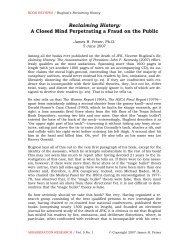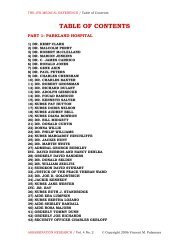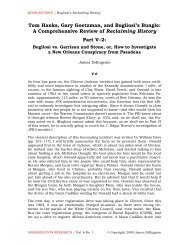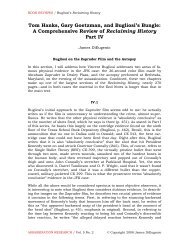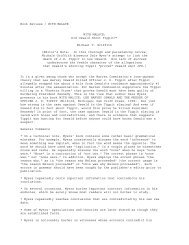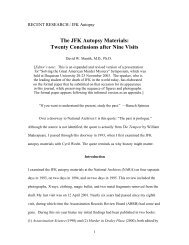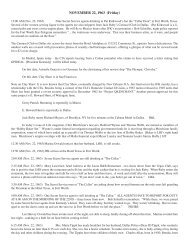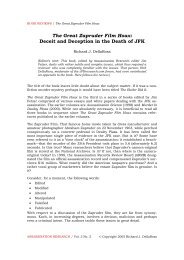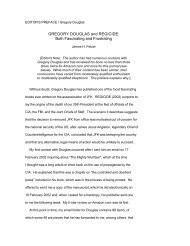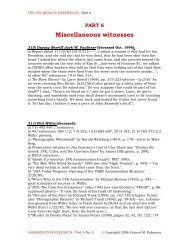A Comprehensive Review of Reclaiming History Part VIII
A Comprehensive Review of Reclaiming History Part VIII
A Comprehensive Review of Reclaiming History Part VIII
Create successful ePaper yourself
Turn your PDF publications into a flip-book with our unique Google optimized e-Paper software.
James DiEugenio 16 Bugliosi’s Bungle, <strong>Part</strong> <strong>VIII</strong><br />
session attendance, partial session attendance, and if the Commissioner asked<br />
questions <strong>of</strong> the witness. He then combined this with the total number <strong>of</strong> questions<br />
asked. After tallying up the totals, he came to the conclusion that the<br />
Commission was actually misnamed: if one looks at the sheer level <strong>of</strong> activity<br />
during the proceedings, it should be called the Dulles Commission (ibid., p. 87).<br />
Let’s quote Brown in this regard: “… the key Commissioner, above and beyond<br />
all others, in the process <strong>of</strong> sifting through the evidence in the murder <strong>of</strong> President<br />
John F. Kennedy, was the former head <strong>of</strong> the Central Intelligence Agency—<br />
and a man who seethed at his removal from that post—by the late John F. Kennedy”<br />
(ibid.). Bugliosi does not inform you about this fact: as with McCloy, he<br />
tells you very little about Dulles the man. Because he was so influential on the<br />
Commission, let us fill in what Bugliosi leaves out.<br />
Allen Dulles was directly related to three Secretaries <strong>of</strong> State. His grandfather<br />
on his mother’s side was John Watson Foster, Secretary <strong>of</strong> State under President<br />
Harrison. His uncle, Robert Lansing, served in that <strong>of</strong>fice under President<br />
Wilson. His brother, John Foster, eventually served under President Eisenhower.<br />
His Uncle Robert and his brother John formed a powerful influence on his<br />
life.<br />
Lansing was an Anglophile who favored England in the World War I disputes<br />
over freedom <strong>of</strong> the seas. He so much admired the British that he took elocution<br />
lessons to mimic a British accent (Leonard Mosley, Dulles, pp. 35, 38). Lansing<br />
was so in cahoots with the British, he actually worked with English undercover<br />
agents in covering their tracks in the breaking <strong>of</strong> neutrality laws (ibid., p. 37).<br />
He brought one <strong>of</strong> them home, and he regaled young Allen with espionage stories<br />
for hours. So Allen developed three proclivities that determined his future:<br />
an admiration <strong>of</strong> England; the ambition to be, like Lansing, an international<br />
lawyer; and his love <strong>of</strong> the spy world.<br />
After Dulles graduated from Princeton, Lansing got him a job in the State Department.<br />
He ended up in Berne, Switzerland. It was in Berne, during World<br />
War I, that he first entered the world <strong>of</strong> intelligence (ibid., p. 39). He met dissident<br />
leaders <strong>of</strong> East Europe like Jan Masaryk and Edouard Benes, and “he began<br />
running networks <strong>of</strong> Czechs and Yugoslavs out <strong>of</strong> the U.S. Embassy” (Jacob<br />
Heilbrunn, “The Old Boy at War,” The New Republic, March 27, 1995, p. 33). He<br />
also met the family <strong>of</strong> Herbert Field, including his controversial son Noel, who,<br />
many suspect, the Dulles brothers used as a double agent later in the Cold War<br />
(Mosley, p. 49). In fact, it was as early as 1918, with the collapse <strong>of</strong> the Hapsburg<br />
Empire, that Dulles first formulated the idea <strong>of</strong> an intelligence network to<br />
thwart the expansion <strong>of</strong> Bolshevism (op. cit., Heilbrunn).<br />
After the war, John Foster Dulles—through his employment at the powerful<br />
New York law firm <strong>of</strong> Sullivan and Cromwell—met Wall Street financier Bernard<br />
Baruch. Baruch helped the brothers gain entry to the Treaty <strong>of</strong> Versailles. With<br />
their Uncle Robert, they worked at redrawing the maps <strong>of</strong> Europe and the Middle<br />
East, and figuring the reparations owed by Germany. During the conference,<br />
Thomas Lamont <strong>of</strong> the Morgan empire made sure that the brothers would be in<br />
on the beginning <strong>of</strong> the American version <strong>of</strong> the British Round Table Groups,<br />
which ended up being called the Council on Foreign Relations (Laurence Shoup<br />
ASSASSINATION RESEARCH / Vol. 6 No. 1 © Copyright 2009 James DiEugenio



